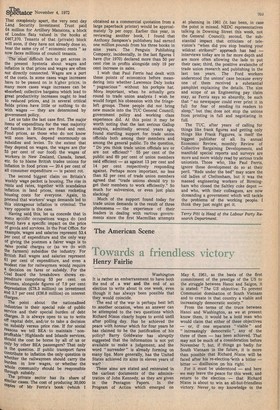The American Scene
Towards a friendless victory
Henry Fairlie
Washington It is rather an embarrassment to have both the end of a war and the end of an election to write about in one week, even though it has always been possible that they would coincide.
The end of the war is perhaps best left to another occasion, when an answer can be attempted to the two questions which Richard Nixon clearly hopes to avoid until after polling day. Has he achieved the peace with honour which for four years he has claimed to be the justification of his policy? Barry Goldwater has abruptly suggested that the information is not yet available to make a judgement, and the word " surrender " is already forming on many lips. More generally, has the United States achieved its aims in eleven years of war?
These aims are stated and reiterated in the earliest documents of the administration of John Kennedy, as they are given in the Pentagon Papers. In the Program of Action which emerged on May 6, 1961, as the basis of the first commitment of the prestige of the US to the struggle between Hanoi and Saigon, it is stated: "The US objective: To prevent Communist domination of South Vietnam and to create in that country a viable and increasingly democratic society."
From the terms of the truce between Hanoi and Washington, as we at present know them, it would be a bold man who would claim that either of these objectives — or, if one separates " viable " and " increasingly democratic ", any of the three of them — has been achieved. That may not be much of a consideration before November 7; but, if things go badly for South Vietnam in the future, it is more than possible that Richard Nixon will be faced after his re-election 'with a bitter — bitter — disillusion ,on-'his right.
For it must be understood — and here we may leave the peace for this week, and return to the election — that Richard Nixon is about to win an all-but-friendless victory. Never , to my knowledge in the








































 Previous page
Previous page